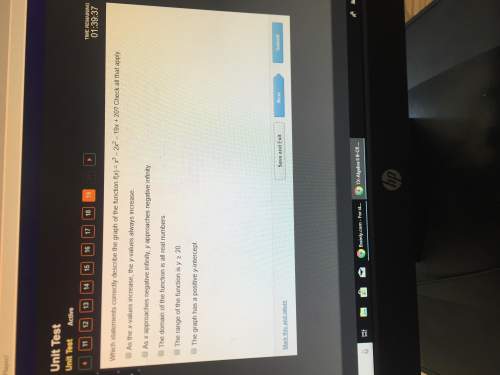
Mathematics, 21.10.2020 16:01 milkshakegrande101
It is said that Napoleon assessed probabilities at the battle of waterloo in 1815. His hopes for victory depended on keeping the English and Prussian armies separated. Believing that they had not joined forces on the morning of the faithful battle, he indicated his belief that he had a 90% chance of defeating the English; P (Napoleon Wins = 0.90). When told later that the elements of the Prussian force had joined the English, Napoleon revised his opinion downward on the basis of this information, but his posterior probability was still at 60%; P(Napoleon Wins │ Prussian and English join Forces) = 0.60. Suppose Napoleon was using Bayes’ theorem to revise this information. To do so, he would have to make some judgment about P(Prussian and English join Forces │ Napoleon Wins) and P(Prussian and English join Forces │Napoleon Loses). In particular, he would have had to make judgment about the ratio of these two probabilities. What is that ratio?

Answers: 1


Another question on Mathematics

Mathematics, 21.06.2019 16:40
Find the solutions for a triangle with a =16, c =12, and b = 63º
Answers: 3

Mathematics, 21.06.2019 19:30
Write a function rule for the table. hours worked pay 2 $16.00 4 $32.00 6 $48.00 8 $64.00 p = 16h p = 8.00h p = h + 16 h = 8.00p
Answers: 1

Mathematics, 21.06.2019 23:00
Two years ago a man was six times as old as his daughter. in 18 years he will be twice as old as his daughter. determine their present ages.
Answers: 1

Mathematics, 21.06.2019 23:30
Write a similarity statement for the similar triangles. afgh ~ a
Answers: 1
You know the right answer?
It is said that Napoleon assessed probabilities at the battle of waterloo in 1815. His hopes for vic...
Questions

Mathematics, 12.04.2021 17:50

Mathematics, 12.04.2021 17:50


History, 12.04.2021 17:50


Computers and Technology, 12.04.2021 17:50

Mathematics, 12.04.2021 17:50



History, 12.04.2021 17:50

Mathematics, 12.04.2021 17:50

Biology, 12.04.2021 17:50

History, 12.04.2021 17:50


Arts, 12.04.2021 17:50

Mathematics, 12.04.2021 17:50


History, 12.04.2021 17:50

English, 12.04.2021 17:50




